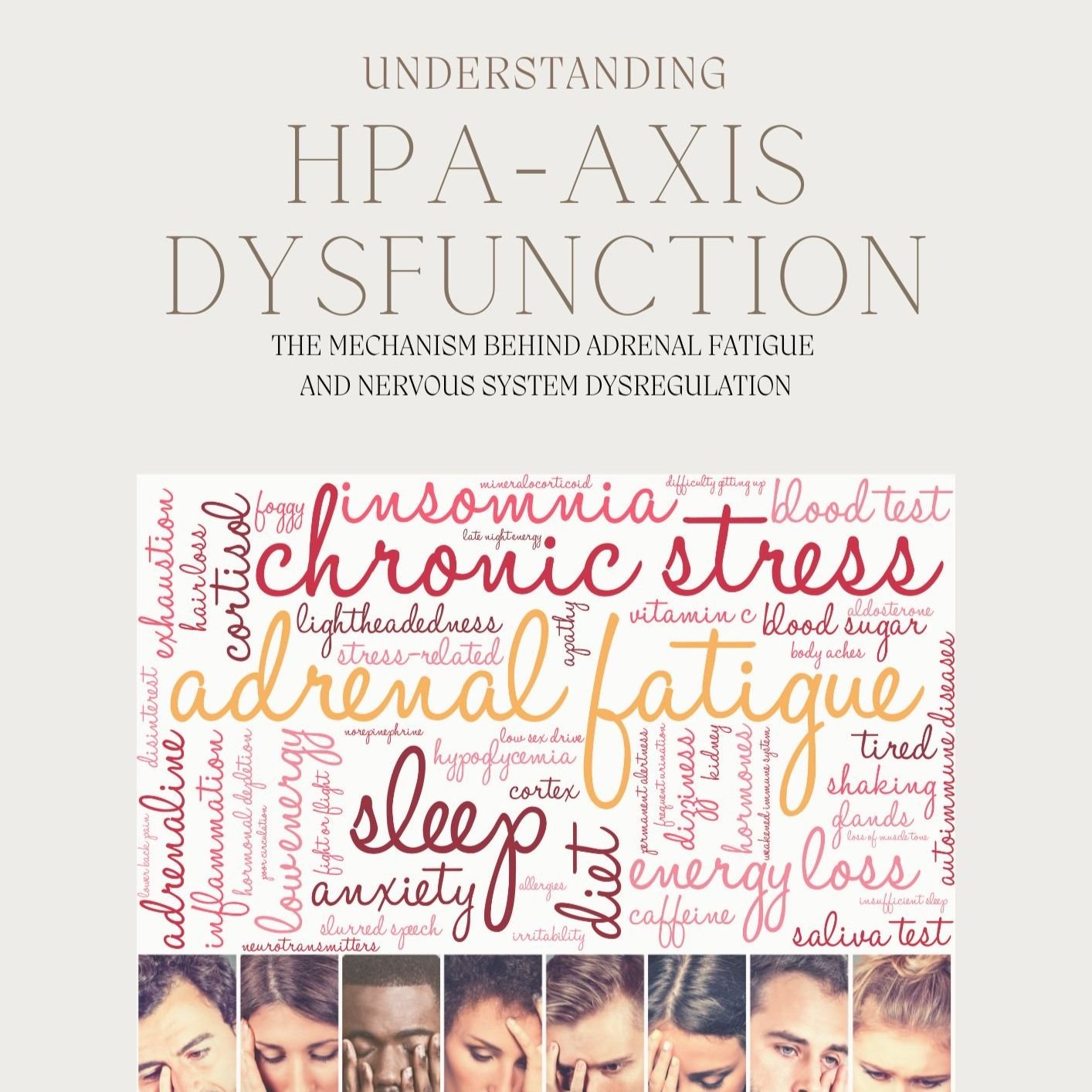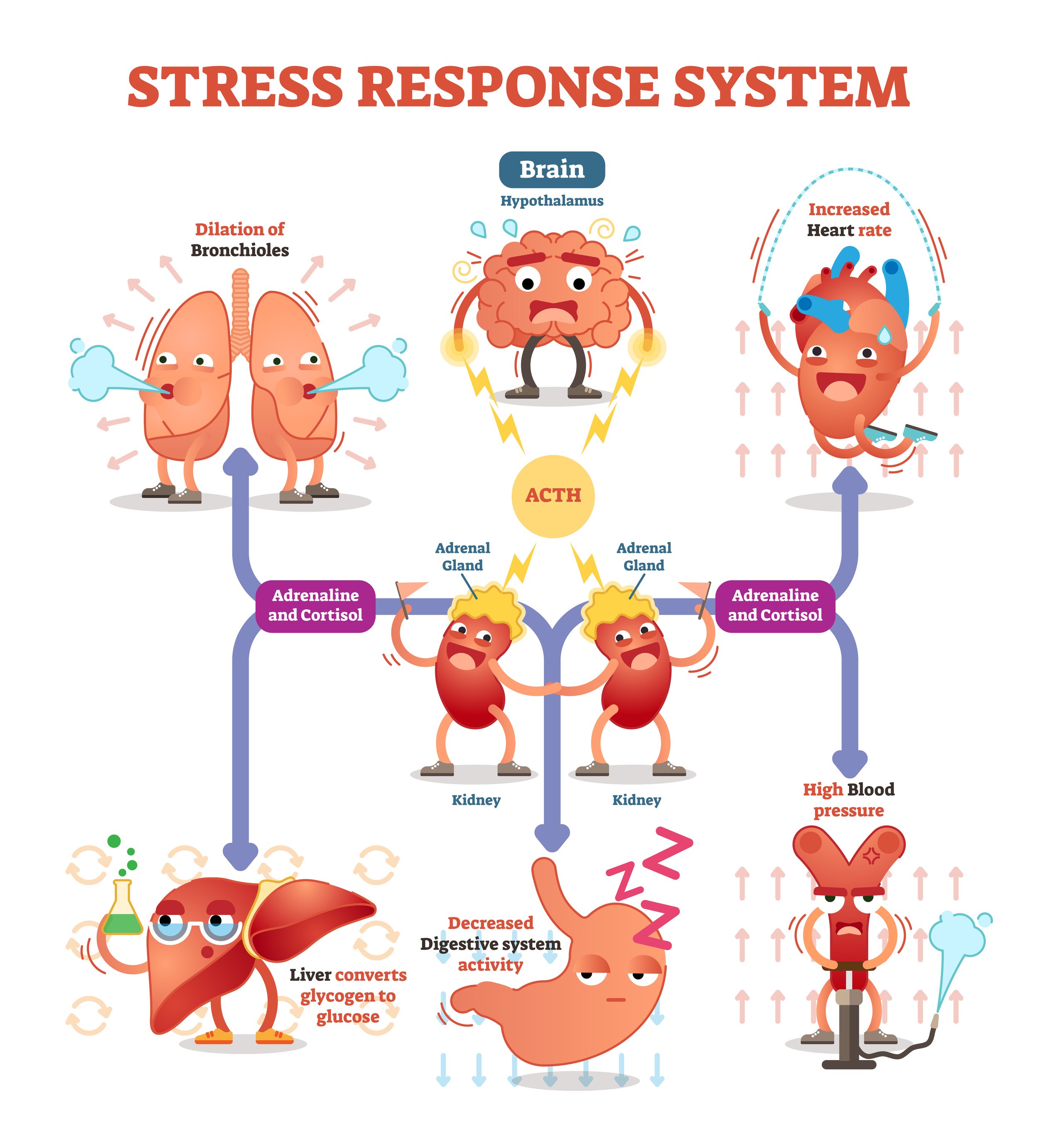Effects of the Stress Response
Adrenal Glands and Hormone Balance
The adrenal glands, otherwise known as the “stress glands” enable your body to cope with stress and survive. Shaped like two tiny pyramids, they sit atop the kidneys and from this central location mobilize your response to every possible change within your environment. Whether coming from outside of ourselves in the form of a natural disaster, or from within, like the anxiety we experience before public speaking, it is the adrenals’ job to help us adapt to the situation.
They accomplish this by secreting key hormones like adrenaline (epinephrine) to mobilize the body’s natural “fight or flight” response in an emergency, and cortisol, the primary stress hormone that fine-tunes our response to the stress and strains of everyday living.
Adrenals in balance produce adequate amounts of DHEA and cortisol to power us through the day, taking stress in stride. Together these hormones impact just about every process in the body, from energy production and immune activity to cellular maintenance and repair. They are key regulators of glucose, insulin and inflammation, and play a major role in bone and muscle building, mood and mental focus, stamina, sex drive and sleep cycles.
Adrenals out of balance are overworked and unable to produce enough essential hormone to keep us running on all cylinders. When a person is under constant physical or emotional stress, the adrenal glands are taxed to release elevated amounts of cortisol, the master stress hormone. But over time, if stress levels remain high, adrenal output is diminished. When that happens, cortisol levels plummet, along with our energy. We start to run out of steam, sleep fitfully, get sick and pack on pounds through the middle. These are the hallmark signs of adrenal fatigue.
Stress and Adrenal Fatigue
The difference between stress we can handle, and stress that gets out of hand – stress vs. distress – marks the difference between adrenal balance and imbalance. The latter occurs when mental, physical or emotional stressors call our adrenal glands to action too often or in a sustained manner, which eventually may lead to adrenal fatigue.
Cortisol’s main impact on the immune system is double-edged. Acute stress sends white blood cells to their battle stations to pump up our defenses against disease. Chronic stress weakens immune reserves leaving us vulnerable to illness, inflammation, and any virus that comes along.
Long Term Stress Effects
When stress is prolonged, adrenal hormones start fluctuating up and down, triggering blood sugar and insulin imbalances, food cravings, weight gain and sleep disturbances. Adrenals under pressure create imbalances of other hormones, e.g., stealing progesterone away from its reproductive duties to make extra cortisol, or inhibiting thyroid function and metabolism.
If stress levels stay high, the adrenals remain in “survival mode” to keep us going: by increasing alertness (i.e., sleeplessness), appetite (i.e., overeating) and fat reserves (i.e., stored as belly fat), while health and immunity against illness and disease steadily weaken.
Healthy Adrenals
When our lives are balanced by optimal nutrition, exercise and enough sleep, the adrenals perform for us 24/7. When we are out of balance and burning the candle at both ends, the adrenals malfunction—and so do we.
In the 21st century, keeping up with life in the fast lane makes us all candidates for adrenal fatigue. People vary greatly in their ability to respond to and withstand stress. Assessing your own stress response and adrenal function can easily be done with a simple saliva test.
HOW DO I PREPARE FOR MY SALIVA CORTISOL TESTING?
THE DAY BEFORE YOU DECIDE TO DO THE SALIVA:
1) If you are a thyroid patient, take any thyroid medications as normal, the day before.
2) It is important to drink a lot of fluids, this helps with saliva production the next day. It is also important to avoid caffeinated drinks the day before as they contribute to dehydration.
THE DAY OF THE SALIVA COLLECTION:
1) Wash your hands before testing, to avoid mixing anything from your hands to your kit.
2) Do not eat, drink, brush your teeth prior to your first collection of the day, or within 2 hours prior to collecting saliva the other three times. (You can have a sip of water only, then wait 5 minutes)
3) ZRT recommends letting saliva pool in your mouth. Patients have also reported things like sniffing a cut lemon, a pickle, etc.
4) It’s not uncommon to take 20 minutes minimum to fill each vial halfway, not including the bubbles.
** Have patience and keep going until you fill the vial to the line that indicates full.
AFTER EACH VIAL OF SALIVA IS COLLECTED:
1) Remember to close the vials tightly.
2) Place all vials in provided plastic bag(s)—some might have a little white absorbent paper inside which you leave in there. (In the summer/hotter months it is important to keep samples cold after collection and during shipping, we recommend you freeze each sample and ship with dry ice, overnight. We’ve found this is the safest way to ship during these times.)
SHIPPING:
Verify that all paperwork/requisition forms are filled out entirely, place completed paperwork and frozen vials in provided test kit box. Place the test kit box, with paperwork and vials, in the shipping package provided. Affix the provided pre-paid label! (If you are shipping overnight during summer months, you will have to purchase your own expedited shipping.)
FAQs
Q: Are there specific supplements or medications I may need to avoid before doing saliva testing?
A: Certain supplements can prevent us from seeing our adrenals natural state. ZRT recommends you discontinue the following before testing:
* 5-HTP (serotonin precursor)
* Adrenal glandular
* Adrenal Cortex
* Ashwagandha
* Asthma supplements (over the counter)
* Astragalus
* Caffeine (from your coffee, tea or certain sodas, for example)
* Cold supplements (over the counter with ephedrine and pseudoephedrine)
* Cordyceps
* DHEA in higher amounts (it’s recommended to be off all DHEA for at least 3 days, says ZRT)
* Flonase
* GABA
* Holy Basil
* Insect bite sprays or creams that contain hydrocortisone
* Jujube
* Kava Kava
* Licorice Root
* Maca
* Magnolia root extract
* Melatonin
* P5P–the active form of B6 (could lower cortisol in some)
* Paba
* Pregnenolone
* Progesterone (in high doses, can raise cortisol)
* Rhodiola
* Phosphatidyl serine (PS)
* Relora
* Schizandra Berry
* Siberian Ginseng (Eleuthero)
* Theanine
* Valerian
* Zinc
Certain Prescription Medications, can prevent us from seeing our adrenals natural state. You may or may not be able to discontinue the following before testing. Please consult your doctor for more information:
* HC (Hydrocortisone like Cortef and other brands)
* Prednisone or Prednisolone
* Medrol (aka Methylprednisone)
* Florinef
* Anti-depressants (whether Tricyclic or SSRI)
* Anti-anxiety meds, aka Benzodiazepines or Benzo (Xanax is an example)
* Antibiotics
* Blood Pressure medications like Spironolactone (Aldactone and CaroSpir)
* Clomid (Clomiphene)
* ADHD meds (Adderall for example)
* Beta Blockers (Lopressor or Toprol XL, Atenolol or Tenormin, Labetalol like Normodyne and Trandate)
* Asthma prescription meds or sprays
* Sleeping Pills (such as Lunesta, Ambien)
* Pain killers for arthritis
* Pain killers for Migraines (aka Imitrex)
* Compounded Progesterone
* Lyrica/Gabapentin
Q: What if I don’t have normal waking hours due to a job or other non-health reasons?
A: If you keep unique hours, saliva testing is done according to those hours. For example, if a normal wakeup time is noon, that is one’s morning. And so on with the other three times.
Q: What if I wake up much earlier than I want to due a low or high cortisol, or an adrenaline or immune system reaction, affecting me?
A: It is best to wait until your “normal” or desired waking hour.
















